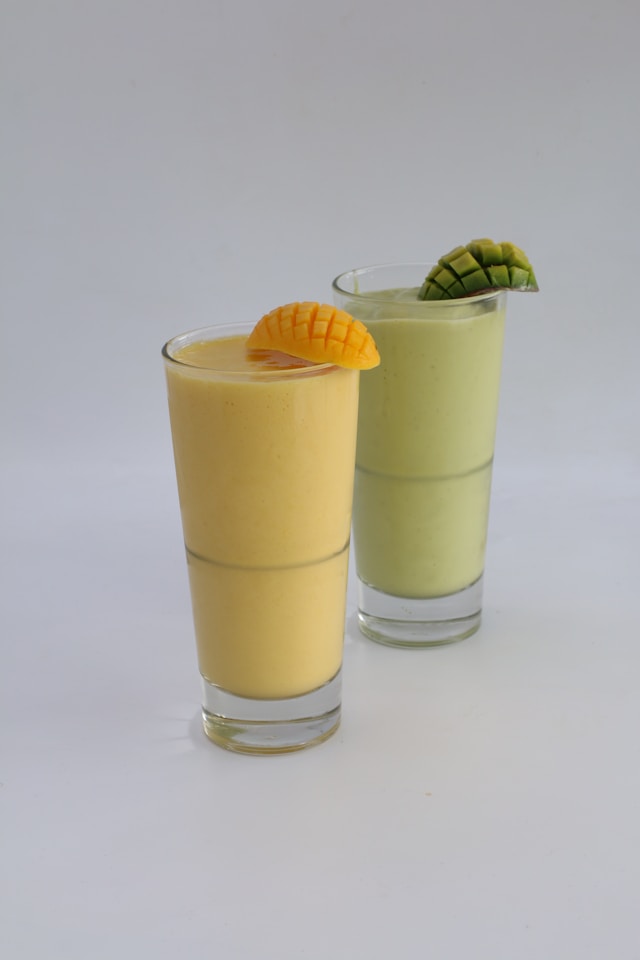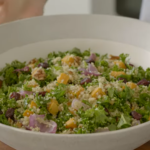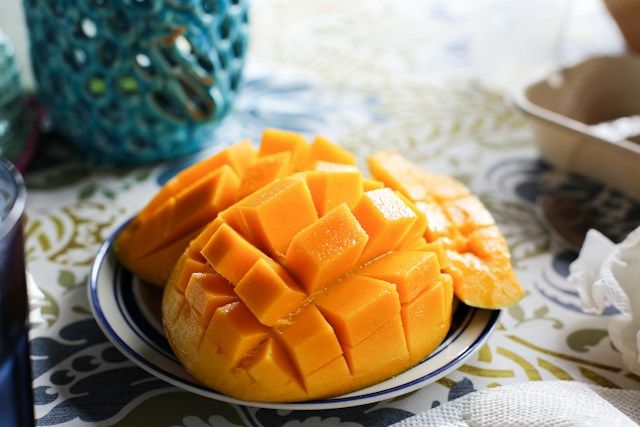Mangoes, known for their sweet and juicy flesh, are not only a culinary delight but also a nutritional powerhouse. This tropical fruit is packed with essential vitamins, minerals, and antioxidants, making it a valuable addition to a healthy diet.
Nutritious Value of Mango
A single cup (165 grams) of fresh mango provides an impressive array of nutrients:
| Nutrient | Amount | Daily Value (%) |
|---|---|---|
| Calories | 99 | 5% |
| Carbohydrates | 25 grams | 8% |
| Protein | 1 gram | 2% |
| Fiber | 3 grams | 12% |
| Vitamin C | 67 mg | 112% |
| Vitamin A | 38 mcg | 76% |
| Potassium | 267 mg | 6% |
| Magnesium | 20 mg | 5% |
| Copper | 0.04 mg | 20% |
Vitamins and Minerals
Mangoes are a good source of vitamin C and A. Vitamin C is a powerful antioxidant that supports immune function and collagen production. Vitamin A is essential for vision, skin health, and immune response.
Mangoes also contain significant amounts of potassium, magnesium, and copper. Potassium regulates blood pressure and cardiac function, whereas magnesium promotes muscle and neuronal activity. Copper is involved in energy production and red blood cell formation.
Antioxidants
Mangoes are rich in antioxidants, including beta-carotene, lutein, and zeaxanthin. These antioxidants protect cells from damage caused by free radicals, which are unstable molecules that can contribute to chronic diseases.
Beta-carotene is converted into vitamin A in the body, further enhancing its antioxidant and immune-boosting properties. Lutein and zeaxanthin are concentrated in the macula, a part of the eye that is responsible for central vision. They help protect the eyes from age-related macular degeneration and cataracts.
Health Benefits
The nutritional value of mango contributes to several health benefits:
- Improved digestion: Mangoes contain enzymes that aid in digestion and prevent constipation.
- Reduced inflammation: Antioxidants in mangoes help reduce inflammation throughout the body.
- Boosted immunity: Vitamin C and other antioxidants in mangoes strengthen the immune system and protect against infections.
- Improved heart health: Potassium and fiber in mangoes support heart health by lowering blood pressure and cholesterol levels.
- Healthy vision: Vitamin A, lutein, and zeaxanthin in mangoes protect the eyes from damage and age-related eye diseases.
What are some other fruits that are rich in antioxidants?

Here are some other fruits that are rich in antioxidants:
- Berries: Berries, such as blueberries, strawberries, raspberries, and blackberries, are packed with antioxidants, including anthocyanins, flavonoids, and phenolic acids. These antioxidants have been linked to a reduced risk of chronic diseases, such as heart disease, cancer, and Alzheimer’s disease.
- Citrus fruits: Citrus fruits, such as oranges, grapefruits, and lemons, are a good source of vitamin C, a powerful antioxidant that helps protect cells from damage. Citrus fruits also contain flavonoids, which have anti-inflammatory and antioxidant properties.
- Grapes: Grapes, especially red and purple grapes, are rich in antioxidants, including resveratrol, quercetin, and anthocyanins. These antioxidants have been shown to have anti-aging, anti-inflammatory, and heart-protective effects.
- Pomegranate: Pomegranate is a fruit that is high in antioxidants, including polyphenols, flavonoids, and anthocyanins. These antioxidants have been linked to a reduced risk of heart disease, cancer, and inflammation.
- Cherries: Cherries are a good source of antioxidants, including anthocyanins, flavonoids, and quercetin. These antioxidants have been shown to have anti-inflammatory, pain-relieving, and heart-protective effects.
- Pineapple: Pineapple is a tropical fruit that is rich in antioxidants, including bromelain, vitamin C, and manganese. These antioxidants have been shown to have anti-inflammatory, antioxidant, and immune-boosting properties.
- Avocado: Avocado is a unique fruit that is high in healthy fats and antioxidants, including vitamin E, lutein, and zeaxanthin. These antioxidants have been shown to have anti-aging, anti-inflammatory, and eye-protective effects.
Incorporating these antioxidant-rich fruits into your diet can help protect your cells from damage and reduce your risk of chronic diseases.
Can you provide some recipes that incorporate mangoes?
Here are some recipes that incorporate mangoes:
Mango Smoothie

Ingredients:
- 1 cup frozen mango chunks
- 1/2 cup plain yogurt
- 1/2 cup milk
- 1 tablespoon honey (optional)
Instructions:
- Combine all ingredients in a blender and blend until smooth.
- Enjoy!
Mango Salsa

Ingredients:
- 2 cups diced mango
- 1/2 cup diced red onion
- 1/4 cup diced jalapeño pepper
- 1/4 cup chopped cilantro
- 2 tablespoons lime juice
- 1 tablespoon olive oil
- Salt and pepper to taste
Instructions:
- Combine all ingredients in a bowl and mix well.
- Serve with chips, tacos, or grilled fish.
Mango Chicken Stir-Fry

Ingredients:
- 1 pound boneless, skinless chicken breasts, cut into bite-sized pieces
- 1 tablespoon olive oil
- 1/2 cup diced mango
- 1/2 cup diced red bell pepper
- 1/2 cup diced green bell pepper
- 1/4 cup chopped onion
- 1/4 cup soy sauce
- 2 tablespoons honey
- 1 tablespoon cornstarch
- 1/4 cup water
Instructions:
- Heat the olive oil in a large skillet or wok over medium-high heat.
- Add the chicken and cook until browned on all sides.
- Add the mango, bell peppers, and onion and cook until softened about 5 minutes.
- In a small bowl, whisk together the soy sauce, honey, cornstarch, and water.
- Add the sauce to the skillet and cook until thickened about 1 minute.
- Serve over rice or noodles.
Mango Lassi

Ingredients:
- 1 cup plain yogurt
- 1 cup mango chunks
- 1/2 cup milk
- 1/4 cup sugar (optional)
- 1/4 teaspoon ground cardamom
- Ice
Instructions:
- Combine all ingredients in a blender and blend until smooth.
- Add ice to taste and blend until slushy.
- Enjoy!
These are just a few examples of recipes that incorporate mangoes. You can also add mangoes to salads, desserts, and baked goods. Enjoy!
Can you recommend any other fruits that go well with mangoes?
Here are some other fruits that go well with mangoes:
- Pineapple: Mango and pineapple are a classic combination that is often used in tropical fruit salads and smoothies. The sweetness of the mango pairs well with the tartness of the pineapple.
- Strawberry: Mango and strawberry is another popular combination that is often used in desserts and fruit salads. The sweetness of the mango complements the tartness of the strawberry.
- Blueberry: Mango and blueberry is a refreshing combination that is often used in smoothies and salads. The sweetness of the mango pairs well with the tartness of the blueberry.
- Raspberry: Mango and raspberry is a delicious combination that is often used in desserts and fruit salads. The sweetness of the mango pairs well with the tartness of the raspberry.
- Blackberry: Mango and blackberry is a unique combination that is often used in pies and cobblers. The sweetness of the mango pairs well with the tartness of the blackberry.
- Peach: Mango and peach is a summery combination that is often used in pies, cobblers, and smoothies. The sweetness of the mango pairs well with the juiciness of the peach.
- Apricot: Mango and apricot is a flavorful combination that is often used in jams, preserves, and desserts. The sweetness of the mango pairs well with the tartness of the apricot.
- Kiwi: Mango and kiwi is a refreshing combination that is often used in smoothies and fruit salads. The sweetness of the mango pairs well with the tartness of the kiwi.
When pairing mangoes with other fruits, it is important to consider the sweetness and tartness of each fruit. You want to create a balance of flavors so that no one fruit overpowers the others.
Here are some additional tips for pairing mangoes with other fruits:
- Use ripe mangoes for the best flavor.
- If you are using frozen mangoes, thaw them before using them.
- Cut the mangoes and other fruits into similar-sized pieces so that they cook or blend evenly.
- Add a little bit of honey or sugar to taste, if desired.
Enjoy experimenting with different fruit combinations to find your favorite mango pairings!
Are there any other fruits that pair well with mangoes in savory dishes?
Yes, several other fruits pair well with mangoes in savory dishes. Here are a few examples:
- Avocado: Mango and avocado is a classic combination that is often used in salads, tacos, and wraps. The sweetness of the mango pairs well with the creamy richness of the avocado.
- Tomato: Mango and tomato is a refreshing combination that is often used in salsas, chutneys, and curries. The sweetness of the mango pairs well with the tartness of the tomato.
- Bell pepper: Mango and bell pepper is a colorful and flavorful combination that is often used in stir-fries, salads, and tacos. The sweetness of the mango pairs well with the crunchiness and mild flavor of the bell pepper.
- Onion: Mango and onion is a classic combination that is often used in salads, salsas, and chutneys. The sweetness of the mango pairs well with the pungency of the onion.
- Ginger: Mango and ginger is a flavorful combination that is often used in curries, stir-fries, and marinades. The sweetness of the mango pairs well with the spicy warmth of the ginger.
- Lime: Mango and lime is a refreshing combination that is often used in salads, dressings, and marinades. The sweetness of the mango pairs well with the tartness of the lime.
When pairing mangoes with other fruits in savory dishes, it is important to consider the overall flavor profile of the dish. You want to create a balance of flavors so that no one fruit overpowers the others.
Are there any specific varieties of mangoes that are particularly nutritious?
Yes, certain varieties of mangoes are particularly nutritious. Here are a few examples:
- Ataulfo mangoes: Ataulfo mangoes are known for their sweet, creamy flesh and bright yellow color. They also include substantial amounts of vitamin C, vitamin A, and fiber.
- Keitt mangoes: Keitt mangoes are large, oval-shaped mangoes with green skin that turns yellow when ripe. They have a sweet, slightly tart flavor and are a good source of vitamin C, vitamin A, and potassium.
- Kent mangoes: Kent mangoes are large, oblong-shaped mangoes with deep orange skin. They have sweet, juicy flesh and are a good source of vitamin C, vitamin A, and fiber.
- Tommy Atkins mangoes: Tommy Atkins mangoes are large, oval-shaped mangoes with a yellow-orange skin. They have a sweet, slightly tart flavor and are a good source of vitamin C, vitamin A, and potassium.
In general, the darker the color of the mango, the more nutrients it contains. However, all varieties of mangoes are good sources of vitamins, minerals, and antioxidants.
Here is a table comparing the nutritional value of different varieties of mangoes:
| Variety | Calories | Vitamin C (mg) | Vitamin A (mcg) | Fiber (g) |
|---|---|---|---|---|
| Ataulfo | 99 | 67 | 38 | 3 |
| Keitt | 101 | 76 | 42 | 3 |
| Kent | 99 | 60 | 33 | 3 |
| Tommy Atkins | 99 | 59 | 32 | 3 |
As you can see, there is not a significant difference in the nutritional value of different varieties of mangoes. However, Ataulfo mangoes have slightly higher levels of vitamin C and vitamin A than the other varieties.
When selecting a mango, seek for one that’s sufficiently ripe but not overripe. The skin should be slightly soft to the touch and free of bruises or blemishes.
Conclusion
The nutritious value of mango makes it a valuable addition to a healthy diet. Its rich content of vitamins, minerals, and antioxidants provides numerous health benefits, including improved digestion, reduced inflammation, boosted immunity, improved heart health, and healthy vision. By incorporating mangoes into your meals, you can enjoy their sweet taste while reaping their nutritional rewards.







